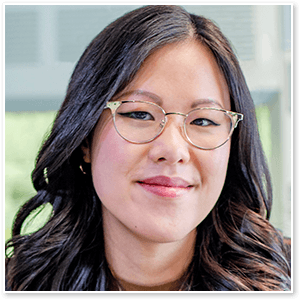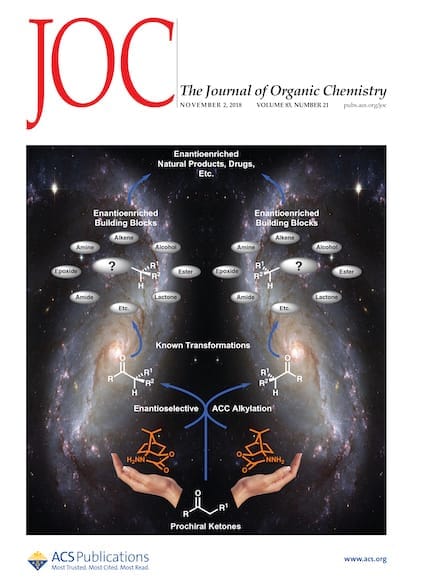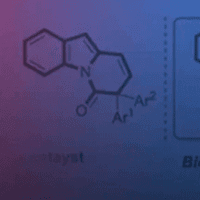Learn about this year's winners— Dusty Cadwallader, Tristan R. Tiburcio, George A. Cieszynski, and Christine M. Le—and their impactful contributions to the field of organic chemistry.

The Journal of Organic Chemistry, in partnership with the ACS Division of Organic Chemistry, is proud to announce the winners of the 2023 Outstanding Publication of the Year Award: Dusty Cadwallader, Tristan R. Tiburcio, George A. Cieszynski, and Christine M. Le.
This award honors the research team of an outstanding article published in the preceding year in The Journal of Organic Chemistry—either in an issue or ASAP—that demonstrates creativity and impact in the field of organic chemistry, broadly based, with a focus on early-career researchers.
Christine M. Le and her group at York University, Canada, are recognized this year for their article, Synthesis of Carbamoyl Fluorides Using a Difluorophosgene Surrogate Derived from Difluorocarbene and Pyridine N-Oxides, which presents an innovative approach to the synthesis of carbamoyl fluorides that bypasses the use of air sensitive, bench unstable, and noncommercial reagents to prepare fluorinated intermediates that will be widely useful in medicinal chemistry.
The research team will be honored during an ACS Division of Organic Chemistry symposium at the ACS Fall National Meeting in San Francisco, California, August 13-17. Learn more about Prof. Le and her research below.

Prof. Christine Le obtained her Ph.D. degree in 2016 at the University of Toronto in the group of Prof. Mark Lautens, where she developed new palladium-catalyzed carbohalogenation reactions and probed the mechanistic intricacies of C–X bond reductive elimination at low-valent metals. In 2017, Prof. Le took up a postdoctoral position at the University of California, Berkeley, in the lab of Prof. Dean Toste, where she worked in the area of chiral anion catalysis. In 2020, Prof. Le returned to Canada to start her independent career at York University.
Her current research program focuses on sustainable organofluorine chemistry. Prof. Le has been the recipient of several awards and recognitions throughout her early career, such as the NSERC Julie Payette, CGS-D and Postdoctoral Fellowships, the Boehringer Ingelheim Award of Excellence in Organic Chemistry, Forbes 30 Under 30 Science, and the Petro-Canada Emerging Innovator Award.
Read the interview with Prof. Le
What does this award mean to you?
I feel exceptionally honored to be this year’s recipient of the JOC Lectureship award and humbled to be considered in the same company as the previous winners. This publication was my first independent paper, and it feels incredibly rewarding to have our chemistry already recognized for its impact on the community. As an early career researcher, I am grateful for the opportunities and increased visibility that this Lectureship award will provide my group with.
How would you describe your research to someone outside your field of research?
My research program seeks to broaden and diversify the reactivity and chemical space of fluorinated organic molecules, with the overarching goal of advancing the synthetic methods to access these compounds. We have a keen interest in developing the chemistry of readily accessible fluorine-containing building blocks, such as carbamoyl fluorides and difluoroacetate derivatives, which can be synthesized from inexpensive starting materials.
What do you think is the biggest challenge currently in your area of research?
It is well established that fluorine substitution can have a dramatic impact on the physiochemical properties of organic molecules. While there have been considerable advances in synthetic organofluorine chemistry, it would be incredibly powerful to be able to selectively incorporate fluorine at any desirable position of a complex molecule, especially at a late stage in the synthesis.
What is next in your research?
We are motivated to utilize cheaper fluorine sources in our method development, including repurposing organofluorine compounds in “fluoride recycling” reactions. In the long-term, I envision that we will be able to apply this chemistry to more inert organofluorides, such as perfluorinated alkyl compounds, to create value-added chemicals from industrial and consumer waste products.
Have there been any highlights in your career to date that you are especially proud of?
Honestly, being able to work with motivated and talented students on a daily basis is the highlight of my job. While it is certainly nice to receive awards and recognitions for my research or teaching, observing students grow and flourish in my lab or the classroom is what makes me feel especially proud.
What would your advice be to someone just starting out in the field?
Success is not accomplished in a vacuum. It is important you identify the right colleagues, mentors, and sponsors early on in your career. My tip is to be open about taking on new opportunities (even if the responsibilities intimidate you) and to take advantage of social media platforms, such as Twitter, to start building your professional and personal network.

